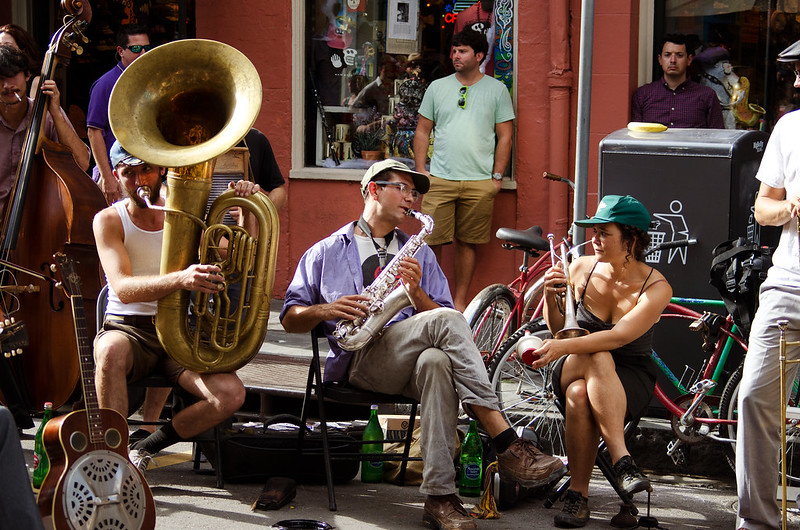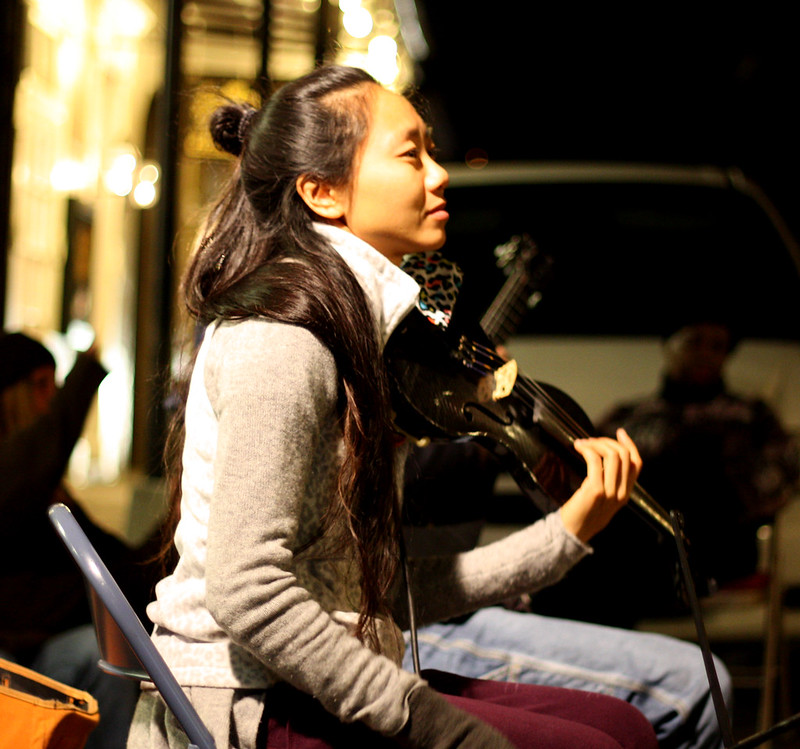PART 1: The Issue
Workers today are in a unique place in history. The increasingly popular “Do What You Love” philosophy leads workers to center their lives around their jobs, making them susceptible to workaholism. Additionally, workers are often putting in more hours for little or no extra pay, effectively subjecting themselves to voluntary wage theft. In New Orleans, these trends are especially evident in the music industry.
Musicians in New Orleans are earning less than ever. Events like Hurricane Katrina and the COVID-19 pandemic have severely impacted the live music scene, a stark contrast to its peak in the late 20th century and early 2000s. Music income has decreased by 43%, and earnings per gig have fallen by 63% since 2005. A 2011 Annual Musicians Report by Sweet Home New Orleans (SHNO) revealed that “income in the [music] community is extremely low; at or near poverty levels… on average, individuals earned about $17,000, and their families earned around $24,000.”
This trend persisted in 2019, with musicians allocating 40-50% of their income to rent, exceeding the 30-40% guideline set by the US Department of Housing and Urban Development. This situation has led to a significant number of New Orleans musicians struggling with rent burden, a condition that AntiGravity Magazine identifies as a cause of stress, potentially leading to high eviction rates and housing instability. The AntiGravity Magazine article further notes that earning $50, $75, or $100 per gig was typical in the 1980s, yet by 2019, the median gig income had only slightly increased to $100 to $125, with a quarter of performances paying $75 or less. Consequently, income from gigs contributes increasingly less to both rent and the overall cost of living, which has escalated due to inflation. Musicians, facing diminishing gig payments, often feel compelled to accept any performance opportunity, regardless of the pay, even if it falls below pre-pandemic levels, highlighting the stark disparity between earnings and the cost of living in New Orleans. Compounding the problem, Jordan Hirsch, executive director of SHNO, reveals that an additional 20% of venues have recently ceased offering guaranteed compensation for gigs.

Musicians performing on the street in New Orleans. Photo: Melissa Segal
Due to these circumstances, many performers undertake additional work to continue playing music at night. New Orleans Saxophonist Seth Bailin is one such musician. In the words of one of Bailin’s colleagues:
“He [Bailin] teaches an after-school marching band class at a public school and does audio editing for a foundation. During Carnival season, he puts on a tux and works in an orchestra at the krewe balls. He plays for weddings, parties, and conventions. And he performs with various bands.” Seth’s career is all too common amongst New Orleans musicians; in SHNO’s 2011 study, they stated how “half [of New Orleans musicians] work non-musical jobs as well, in an incredibly wide range of fields. [They] are the backbone of New Orleans’ hospitality industry, creating the soundtrack of our stress and the basis of our reputation around the world.”
This scenario prompts the question, “if [musicians] don’t make enough money, then why do it?” A 2017 Music Industry Research Association study found that musicians are primarily driven by their love for artistic expression, performance, and collaboration, despite financial insecurity being their main concern.
PART 2: The Solution
Music is an inherently collaborative medium. Yet, when it comes to employment, musicians often face isolation. By uniting in their professional endeavors as they do in music, musicians can forge a better system for all. The solution is clear: musicians need to form a worker’s union.
New Orleans hosts a chapter of the American Federation of Musicians (AFM), the primary musicians’ union in North America. Although its effectiveness in New Orleans has been limited, unionization remains a crucial strategy for systemic change. New Orleans musicians and the AFM can learn from the film industry unions, such as the Screen Actors Guild (SAG).

SAG co-founder and comedian Eddie Cantor. Source: Wikipedia Commons
SAG was founded in 1933 to help prevent the exploitation of actors in various ways. For instance, actors were often trapped in oppressive, multi-year contracts. SAG members combated studio greed and exploitation, fighting for fair contracts and working conditions.
In March of 1933, six prominent actors led the charge in creating the guild. After major production companies at the time privately agreed not to bid competitively for actors, SAG went from 80 members to more than 4,000 in just 3 weeks. Founding member Eddie Cantor’s ties to President Franklin D. Roosevelt were pivotal for the union’s early achievements. By 1937, major studios began negotiating with SAG, culminating in a contract guaranteeing a minimum wage.
Today, production companies must comply with SAG agreements for union actors. Alison Cohen of Filmnation Entertainment emphasizes the integral role of unions: “You can’t make a film or TV show without working with unions, as all qualified actors and directors are members.”
New Orleans musicians, akin to 1930s Hollywood actors, face exploitation by venue owners, who leverage their power to coerce performances for minimal compensation.
For the New Orleans AFM to mirror SAG’s success, a significant percentage of local musicians must become members. This crucial first step ensures that venues, bars, and other employers must comply with the union’s terms to hire musicians. With a strong membership base, the AFM can focus on three key improvements: establishing minimum wages, securing good working conditions, and providing member protection.
Cohen explains that SAG sets varying minimum wages based on the type of work. For example, minimum wages differ for high-budget and low-budget films, and for different job roles like voice acting versus on-screen acting. For instance, in a low-budget film agreement, the minimum rates are $703 per day and $2,441 per week.

Woman playing the violin in the French Quarter. Photo: Chris Cast
The AFM could adopt a similar strategy in New Orleans, setting diverse minimum wage rates for different venues and events. Smaller venues might have lower rates, while larger venues and music festivals could command higher wages. Rates could also vary based on peak times, such as late nights on Frenchman Street.
Cohen also notes that SAG agreements ensure fair working conditions including set working hours and mandatory meal breaks. Production companies are faced with financial penalties if they fail to comply. Cohen adds, “One of the biggest benefits that SAG has had on actors is ensuring their safety. As an example, when productions started back up after the initial wave of COVID-19, SAG (together with other film unions) created a 100-page return to work agreement which outlined the mandatory safety protocols that productions would need to comply with when filming.”
The AFM could incorporate similar demands for safe working conditions in New Orleans venues. Given that these venues often become crowded, the AFM can mandate that all venues comply with fire codes and provide a safe performance environment for musicians. Additionally, AFM agreements could stipulate that venues hire adequate security to protect musicians from potentially disorderly patrons.
Cohen highlights SAG’s significant role in protecting its members, chiefly by providing free health insurance and pensions. Production studios hiring a union member are obliged to contribute an extra “pension, health and welfare” fee (about 20% of the member’s rate) to the union. Members must earn a specified minimum amount to qualify for these benefits, which offer free healthcare and a pension upon retirement. Moreover, union staff are available to assist members with any violations of union rules in their workplace.
A healthcare and pension plan would not only offer musicians essential long-term security and health benefits, currently lacking in their profession, but the minimum earning requirement would also encourage members to undertake more gigs. This would benefit the musicians, the New Orleans music scene, and the city as a whole. The AFM would require that employers of musicians cover the pension, health, and welfare fees. Furthermore, the union would employ dedicated staff to address any issues that members encounter with venues or employers.
PART 3: The Implementation
Given the current trajectory of the music industry in New Orleans, there’s a genuine risk of its decline. Action is needed now in order to preserve and revitalize New Orleans’ rich musical heritage for future generations.

Famous New Orleans-born musician Trombone Shorty. Photo: Christopher Ludtke
New Orleans’ economy heavily relies on tourism. The city is Louisiana’s most profitable travel region, with visitors spending over six and a half billion dollars in 2021. Tourism also supports over 60,000 hospitality jobs and significantly reduces tax burdens for New Orleans households.
A primary draw for tourists to New Orleans is its vibrant music scene. According to the top 10 rankings on Google for the best U.S. music cities, New Orleans consistently appears at or near the top. Festivals like Jazz Fest, BUKU, and Essence significantly contribute to the economy. Entertainment and recreation are key drivers of tourism in New Orleans, generating billions in annual revenue.
These facts and statistics have the potential to persuade local politicians and business leaders of the need to sustain and rejuvenate New Orleans’ music scene. The survival of New Orleans music is intertwined with the well-being of its musicians, who desperately need the support of a powerful union.
Reinvigorating the union aligns with the interests of all stakeholders in New Orleans. It enables more musicians to perform, attracting additional tourism, and benefiting the city. Musicians, politicians, business owners, and residents alike recognize that unity and cooperation are key to fostering a thriving New Orleans musician environment.
This article was written by Jed Cohen, a student at Tulane University. He is available for contact at jcohen35@tulane.edu.
Edited by Connor Hogan, a dual degree student in Marketing and Political Science at Tulane University. He is available for contact at chogan8@tulane.edu.
 Earthtalk: “Cool Roofs” for New Orleans
It’s hot outside, but it could be cooler! In this article, Brooke Theis explores Cool Roofs, an effective solution to the urban heat island effect that makes the New Orleans heat so unbearable. The author also explores inequalities in how people experience the environment from identity perspectives like race and class.
Earthtalk: “Cool Roofs” for New Orleans
It’s hot outside, but it could be cooler! In this article, Brooke Theis explores Cool Roofs, an effective solution to the urban heat island effect that makes the New Orleans heat so unbearable. The author also explores inequalities in how people experience the environment from identity perspectives like race and class.
 Big Chem-EZ: How can small Louisiana communities access clean drinking water after a hurricane?
When I went to visit the Pointe-au-Chien tribe after Hurricane Ida with my Service Learning class, I heard that one of the biggest challenges in the aftermath of the hurricane was finding enough drinking water, so in this article, I explore water purification methods: 1) when they are necessary, 2) how they work, and 3) if they really make your water safe to drink.
Big Chem-EZ: How can small Louisiana communities access clean drinking water after a hurricane?
When I went to visit the Pointe-au-Chien tribe after Hurricane Ida with my Service Learning class, I heard that one of the biggest challenges in the aftermath of the hurricane was finding enough drinking water, so in this article, I explore water purification methods: 1) when they are necessary, 2) how they work, and 3) if they really make your water safe to drink.

[…] Source […]